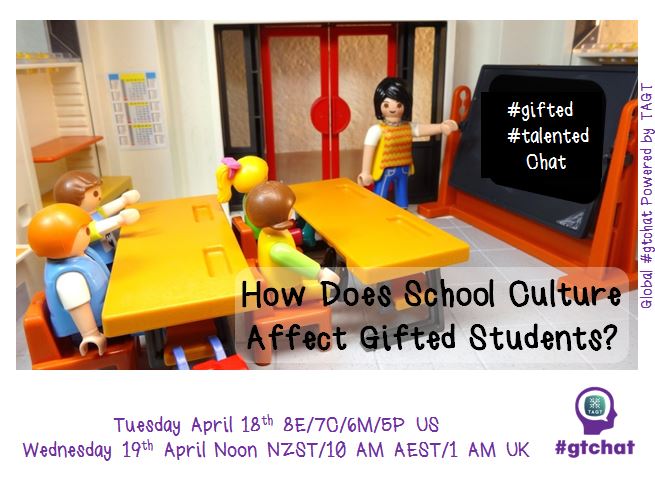
A school’s culture – particularly how it views gifted education – can have a profound effect on a gifted student. It is a concern for parents who are looking for an environment where their child will thrive academically as well as socially.
Before choosing a school (if they are fortunate to have a choice), there are a few things parents can do to assess the school’s culture. Of course, they should visit the school to meet with administrators and teachers. They can ask questions about gifted programming K-12 and school policy on identification of gifted students. Parents should try to attend after-school activities, athletic events, and parent group meetings to talk to other parents. Also, don’t forget to visit the school’s website and social media sites.
School culture most often reflects the values and interests of the community in which it is located. Rural, suburban and urban areas may exhibit different cultures while being in the same part of the country. A school’s location may benefit from nearby colleges and universities – opportunities for gifted students.
What affect does teacher’ attitude toward gifted programs have on a school’s culture? Gifted students are often highly perceptive of other’s attitudes – this can affect their self-esteem. An atmosphere where gifted programs aren’t valued can diminish gifted programs.
Conversely, gifted students can have a positive effect on school culture. Gifted students can model excellence in learning; exhibiting the benefits of academic success. They often serve in leadership roles in school groups/clubs/competitive academic challenges.
Socio-economic factors can have a major effect on a school’s culture and how its gifted programs are crafted. The effects of low-ses factors must be recognized and all should strive for equitable identification.
School culture can have a significant impact on a student’s mental health. Parents should be on the lookout if a school’s culture is having a negative impact on their student. Gifted students can slip under the radar; become underachievers; or even drop out. It is important to be vigilant when considering a school’s culture. A transcript of the chat may be found at Storify.

Global #gtchat Powered by the Texas Association for the Gifted and Talented is a weekly chat on Twitter. Join us Tuesdays at 8E/7C/6M/5P in the U.S. and Wednesdays at Noon NZST/10 AM AEST/1 AM UK to discuss current topics in the gifted community and meet experts in the field. Transcripts of our weekly chats can be found at Storify. Our Facebook Page provides information on the chat and news & information regarding the gifted community. Also, checkout our Pinterest Page and Playlist on YouTube.
 About the author: Lisa Conrad is the Moderator of Global #gtchat Powered by TAGT and Social Media Manager of the Global #gtchat Community. She is a longtime advocate for gifted children and also blogs at Gifted Parenting Support. Lisa can be contacted at: gtchatmod@gmail.com
About the author: Lisa Conrad is the Moderator of Global #gtchat Powered by TAGT and Social Media Manager of the Global #gtchat Community. She is a longtime advocate for gifted children and also blogs at Gifted Parenting Support. Lisa can be contacted at: gtchatmod@gmail.com
Links:
Using Student Feedback to Improve School Culture
How A Happy School Can Help Students Succeed
Get the Culture Right: The Most Important New School Factor
What Do Students Say About School Culture
Why Good Schools Are Happy Places
High-Potential Students Thrive when School Districts Develop Sustainable Gifted Services
Building a School Culture of High Standards
Teacher Perspectives Regarding Gifted Diverse Students (pdf)
AUS: Teachers’ Attitudes towards Gifted: Importance of Professional Development & School Culture (pdf)
CO Dept. of Ed: Gifted Students Implementation Recommendations & Key Messages
Serving Montana’s High Ability/High Potential Students Planning Guide & Strategies (pdf)
Germany: Giving the Gifted a Chance to Flourish
5 Reasons Gifted Students Decide to Leave School
Gifted and talented kids: How do you nurture a curious mind?
Introverts tend to be better CEOs — and other surprising traits of top-performing executives
Jo Freitag: Personas, Profiles and Portraits The Country Kids
The Search for Shangri-La: Finding the Appropriate Educational Environment for Gifted and Twice-Exceptional Children, A Parent’s Guide by Mike Postma, Executive Director, SENG
Introverts tend to be better CEOs — and other surprising traits of top-performing executives
Gifted and talented kids: How do you nurture a curious mind?
Photo courtesy of Pixabay CC0 Public Domain
Graphic courtesy of Lisa Conrad


